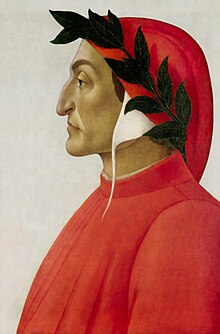Dante Alighieri
| Dante Alighieri | |
|---|---|

|
|
| Born | May/June c. 1265 Florence, Republic of Florence |
| Died | September 13/14, 1321 (aged c. 56) Ravenna, Papal States |
| Occupation | Statesman, poet, language theorist, political theorist |
| Nationality | Italian |
| Period | Late Middle Ages |
| Literary movement | Dolce Stil Novo |
Durante degli Alighieri (Italian: [duˈrante deʎʎ aliˈɡjɛːri]), simply called Dante (Italian: [ˈdante], UK /ˈdænti/, US /ˈdɑːnteɪ/; c. 1265 – 1321), was a major Italian poet of the Late Middle Ages. His Divine Comedy, originally called Comedìa (modern Italian: Commedia) and later christened Divina by Boccaccio, is widely considered the greatest literary work composed in the Italian language and a masterpiece of world literature.
In the late Middle Ages, the overwhelming majority of poetry was written in Latin, and therefore accessible only to affluent and educated audiences. In De vulgari eloquentia (On Eloquence in the Vernacular), however, Dante defended use of the vernacular in literature. He himself would even write in the Tuscan dialect for works such as The New Life (1295) and the aforementioned Divine Comedy; this choice, although highly unorthodox, set a hugely important precedent that later Italian writers such as Petrarch and Boccaccio would follow. As a result, Dante played an instrumental role in establishing the national language of Italy. Dante's significance also extends past his home country; his depictions of Hell, Purgatory, and Heaven have provided inspiration for a large body of Western art, and are cited as an influence on the works of John Milton, Geoffrey Chaucer and Alfred Tennyson, among many others. In addition, the first use of the interlocking three-line rhyme scheme, or the terza rima, is attributed to him.
...
Wikipedia
